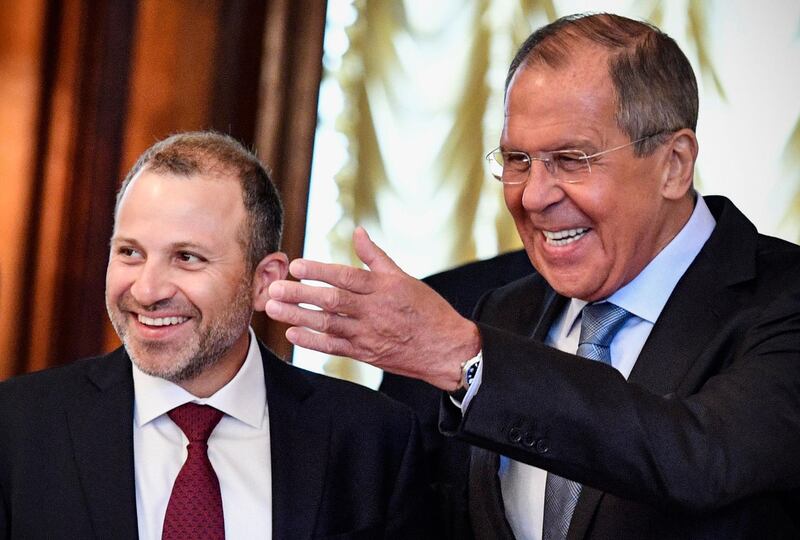Russia will help Lebanon return displaced Syrian refugees to their country, Russian Foreign Minister Sergey Lavrov said on Monday after talks in Moscow with Lebanese Foreign Minister Gebran Bassil.
About 7,000 refugees have returned to Syria from Lebanon in the past month and conditions for more returns are improving, Mr Lavrov said. Russia is seeking to "resolve the problem of Syrian refugees as soon as possible", Mr Lavrov said. He said that Lebanon should not become a hostage of the Syrian refugee crisis, and Russia was opposed to foreign intervention in Lebanon's domestic affairs.
In televised comments after the meeting, Mr Bassil said: “Lebanon refuses to tie the return of the refugees to the political solution" [in Syria].
Given western reluctance to assist the return of refugees, Mr Bassil praised Moscow's engagement. "The Russian proposal is the first international proposal that encourages the return of refugees, and Lebanon is committed to it fully. We discussed an enduring, open-ended communication between our ministries to ensure the success of this proposal," he said.
"Russia's position confirms its principle-based approach to resolving the situation in the region, as the refugee issue has been making the matters worse," Mr Bassil said, according to Russian state media outlet Tass.
This year, the two countries formed a joint committee to oversee the return of refugees, as hundreds of displaced people began heading back to Syria.
Lebanon officially hosts just less than one million Syrian refugees, although with unregistered displaced people the government has estimated the figure at more than 1.5 million.
Mr Bassil said he was willing to co-ordinate efforts to return refugees with Moscow, Damascus and the UN. The Lebanese government doesn’t officially have contact with the Syrian regime although the continuation of that policy caused rifts in the previous government.
The foreign minister's Free Patriotic Movement and other pro-Syrian parties lobbied to re-establish ties to Damascus. However, caretaker Prime Minister Saad Hariri's Future Movement and other anti-Syrian parties – many former members of the now-defunct March 14 coalition – rejected the move.
Lebanon does maintain contact on issues of security and cross-border matters and agencies, such as the powerful General Security Directorate, have acted as a channel to Damascus on the return of refugees.
Mr Bassil previously accused UNHCR – the UN agency for refugees – of trying to dissuade Syrians from heading home.
The agency strongly denied the claims and highlighted that it has assisted those trying to return by ensuring they have the correct paperwork to resettle in their country of origin.
However, it also pointed out that all returns must be voluntary and those heading back must be able to live safely, in dignity and according to international law on refugee protection. The UN and western states have stressed that it is too early for refugees to return to Syria given the continuing fighting.
Although large parts of the country are now under government control, more people were internally displaced in 2018 than in any other year in the conflict that began in 2011.
______________
Lebanon, Russia talk refugee return:
Lebanon and Russia form committee on Syrian refugee repatriation
After painful search, Syrians learn detained relatives are long dead
Russia to talk Syrian refugee return plan in Beirut
______________
During the meeting with Mr Lavrov, Mr Bassil also said he wanted Russian companies to take part in a new tender to develop potential oil and gas deposits on the Lebanese shelf.
It would bolster regional stability if a Russian company won the contract, Mr Bassil said.
Although Lebanon has no proven oil or gas reserves, preliminary data shows a strong likelihood of deposits. Only exploratory drilling will show whether this is correct and if economically viable quantities can be extracted.
In February, the energy ministry finalised a deal with three companies – France's Total, Italy's ENI and Novatek of Russia – after the first licensing round.
The companies say they will begin exploration in the two licensed zones, one off the coast north of Beirut and the other, more controversial area, abutting the disputed southern maritime border with Israel.
The Lebanese government has also pressed ahead with the second licensing round despite the companies not planning the first exploratory drilling operations until next year.
Mr Bassil said Lebanon should serve as a platform for the economic regeneration of neighbouring Syria and that Beirut would co-ordinate its efforts with Moscow, the Interfax news agency reported.






